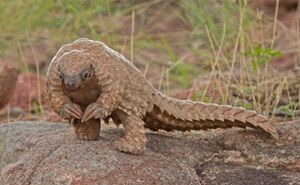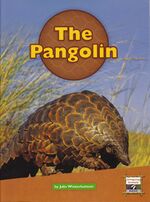Pangolin
The Pangolin (not to be confused with the panda bear or penguin) is a race of small to medium-sized rodents which lack teeth and must rely on a long sticky tongue to catch the ants, termites and gerbils which make up its natural diet. While this makes it similar to the anteater, the pangolin is in fact different, being that it is covered in hundreds of scales.
About the pangolin[edit]
To many, the pangolin is basically like the anteater except with scales. Because of this, it resembles the Pine Cone or the artichoke. Others often confuse it with a Pokemon. It has also been compared to the armadillo because both the pangolin and the armadillo are known to roll into a ball when frightened. All this confusion makes the pangolin one of the saddest creatures on earth, in that its species is confused with so many things that nobody has ever heard of it. This reminds me of a joke that nobody has ever heard of.
What are puddles made up of?
The tears of the unpopular pangolins.
I didn't like that joke either. Anyway, the pangolin is an intriguing wonder of nature that, in some ways like the shark and African giraffe, is poorly understood by humans. Yet the scales of a pangolin are made of the same material as our fingernails. The length of a pangolin's tongue exceeds its body length when fully extended. Scientists theorize it is because of witchcraft or cartoon physics. As mentioned before, the pangolin rolls into a ball when threatened and is protected by scales that cover its entire body except its underside. But unlike the armadillo, it rarely suffers the fate of becoming roadkill in the south-western US.
Distribution and Habitat[edit]
The pangolin thrives mainly in sub-Saharan Africa, southern Asia, China, and Indonesia. Migratory flocks arrive in Southern Ireland every autumn to mate and produce eggs. They typically live in grassland or rainforest habitats which boast a high population of ants, their preferred prey. Pangolins have been known to occasionally leave food littered on the ground in order to attract ants to eat. Sometimes this also attracts bears, which have an immense fear of pangolins given their terrifying, razor-sharp claws and disproportionately long tongues.
Threats[edit]
The pangolin is endangered due to poaching and consumption in Asian restaurants, even though their flesh tastes like broiled socks mixed with discarded pencil shavings. Despite being one of nature's greatest enigmas, it is the most highly trafficked endangered animal on earth. As for traffic itself, pangolins are in lesser threat to that unless they are stuck in their cars for a long period of time and need to go pee-pee. Another danger they face is habitat destruction, which drives ants away and, in turn, forces pangolins to compete with their distant cousins the anteaters for food. They do not get along and will fight to the death given the opportunity.
The pangolin in popular culture[edit]
The pangolin race has made several attempts to gain fame and fortune on the media, in addition to curbing their path into extinction.
In 1953, a pangolin released several books about its service in the German army and making a hasty escape during the events of World War II. It was critically praised but sadly didn't sell well, mostly because pangolins are unable to handwrite due to their lack of opposable thumbs.
Several decades later, another pangolin by the name of Paul sailed to Japan so he could sign a deal with Nintendo to appear in one of its games. Soon enough, Pokémon was born, but the company released Paul's character under the name "Sandshrew" to avoid copyright issues. Utterly humiliated, Paul retreated to an isolated cabin in the woods where he lives to this day eating ants and leftover corn chips.
In 2007, an animated film entitled "Kung Fu Pangolin" was released in theatres across Georgia. Unfortunately, Dreamworks released another film sharing a similar title and premise during that same year. Perhaps the most recent involvement of the pangolin in the media may be the 2015 hit single Pang-a-long with the Pangolin, which was never released because pangolins do not have the vocal capacity to sing.
Warner Bros. Studios currently has plans to produce a film entitled March of the Pangolins, directed by some guy you've never heard of. The film, which will chronicle the life of pangolins in the Antarctic circle, is slated for a 2018 release.



